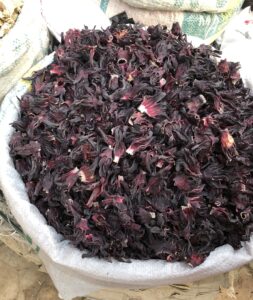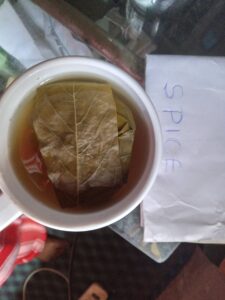Zobo leaves, also known as hibiscus leaves or sorrel leaves, refer to the dried calyxes of the hibiscus sabdariffa plant. It is commonly used to make a popular beverage known as zobo or hibiscus tea, particularly in West Africa. Here are some key points about zobo leaves and their potential benefits:
1. Rich in antioxidants: Zobo leaves contain high levels of antioxidants, particularly anthocyanins, which give the calyxes their vibrant red color. Antioxidants help protect the body against oxidative stress and may have potential benefits for overall health.
2. Heart health: Consumption of zobo tea has been associated with potential cardiovascular benefits. Some studies suggest that the antioxidants in zobo leaves may help lower blood pressure and reduce LDL (bad) cholesterol levels. However, more research is needed to fully understand the extent of these effects.
3. Anti-inflammatory effects: Zobo leaves have been traditionally used for their anti-inflammatory properties. The presence of certain compounds in the leaves may help reduce inflammation in the body, which is linked to various chronic diseases.
4. Digestive health: Zobo tea is known to have mild diuretic and laxative effects, which can support digestive health. It may help promote bowel movements and alleviate constipation. Additionally, the tea is sometimes used to soothe stomach discomfort and improve digestion.
5. Hydration: Zobo tea is a refreshing and hydrating beverage, especially when served cold. It can be a flavorful alternative to sugary drinks and sodas, making it a healthier choice for quenching thirst.
6. Potential weight management aid: Zobo tea is often consumed as a low-calorie beverage and may aid in weight management. It is naturally free of caffeine and can be enjoyed as a satisfying, flavorful drink without adding excess calories.
7. Immune support: Zobo leaves contain vitamin C and other immune-supporting compounds that may help boost the immune system. Regular consumption of zobo tea, along with a balanced diet, can contribute to overall immune health.
8. Traditional uses: In addition to its potential health benefits, zobo leaves have been used in traditional medicine for their perceived properties such as improving digestion, reducing menstrual cramps, and supporting kidney health. However, further scientific research is needed to confirm these claims.
It’s important to note that while zobo leaves offer potential health benefits, individual responses may vary, and excessive consumption should be avoided. Additionally, some people may experience interactions or adverse effects when consuming zobo tea alongside certain medications. If you have specific health concerns or are taking medications, it’s advisable to consult with a healthcare professional before incorporating zobo leaves or tea into your routine.





No comments yet, be the first to leave one!